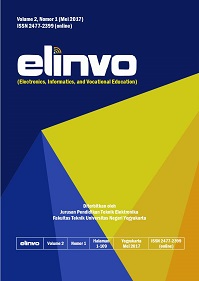Analisis Desain Website Terhadap Budaya Pendekatan Teori Hofstede
DOI:
https://doi.org/10.21831/elinvo.v1i1.12814Keywords:
Teori Hofstede, Websie, Indonesia, Uruguay, MesirAbstract
Penelitian ini bertujuan untuk mengetahui pengaruh kebudayaan terhadap desai suatu website dan mengetahui budaya apakah yang berkembang di daerah tersebut melalui desai websitenya. Metode yang digunakan adalah studi kasus. Variabel yang digunakan ada 5, sesuai dengan Teori Hofstede, yaitu Power Distance (Jarak Kekuasaan), Indivialism vs Collectivism (Individualisme vs Kolektivisme), Masculinity vs Femininity (Maskulinitas vs Feminitas), Uncertainty Avoidance (Penghindaran terhadap Ketidakpastian), dan Long Term Orientation vs Short Term Normative (Orientasi Jangka Panjang vs Orientasi Normatif Jangka Pendek. Penelitian ini membandingkan tiga website yang berasal dari tiga negara yang berbeda, bahkan benua yang berbeda. Hasilnya terdapat perbedaan desain website yang dipengaruhi oleh budayanya.
References
Kim, H., J.R. Coyle, and S.J. Gould, Collectivist and Individualist Influences on Website Design in South Korea and the U.S.: A Cross-Cultural Content Analysis. Journal of Computer-Mediated Communication, 2009. 14: p. 581–601.
Ahmed, T., H. Mouratidis, and D. Preston, Website Design Guidelines: High Power Distance and High-Context Culture. International Journal of Cyber Society and Education, 2009. 2: p. 47 60.
Yuhefizar, 10 Jam Menguasai Internet Teknologi dan Aplikasinya. 2008, Jakarta: PT Elex Media Komputindo.
Yuhefizar, H. Mooduto, and R. Hidayat, Cara Mudah Membangun Website Interaktif Menggunakan Content Management System Joomla. 2008, Jakarta: PT Elex Media Komputindo.
ZHAO, W., et al., Cultural Dimensions of Website Design and Content. Prometheus, 2003. 21: p. 10.
Hofstede, G. National Culture. Dimensions of national culture [cited 2015 June 24]; Available from: http://geerthofstede.com/national-culture.html.
Hofstede, G., G.J. Hofstede, and M. Minkov, Cultures and Organizations, in SOFTWARE OF THE MIND Intercultural Cooperation and Its Importance. 2010, McGraw-Hill. p.576.
Institute, I.S. Developing Countries. 2015 [cited 2015 24 June]; Available from:
http://www.isiweb.org/component/content/article/5-root/root/81-developing.
Downloads
Published
How to Cite
Issue
Section
Citation Check
License
The article published in ELINVO became ELINVO's right in publication.
This work by ELINVO is licensed under a Creative Commons Attribution-NonCommercial 4.0 International License.








